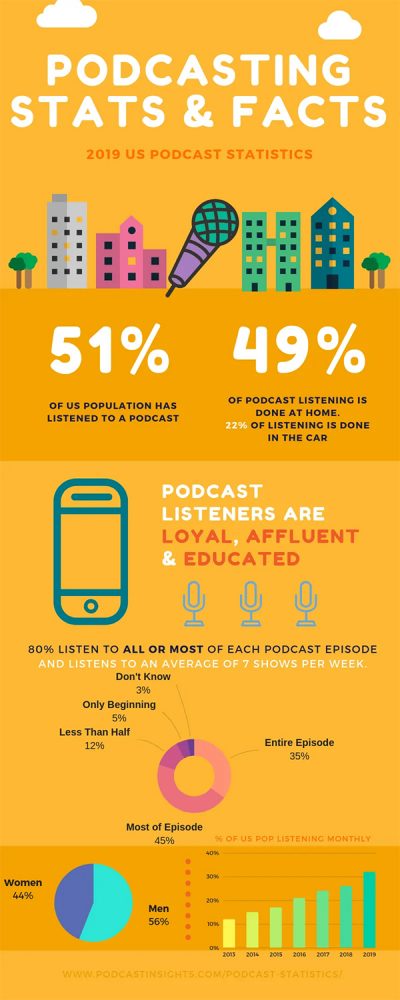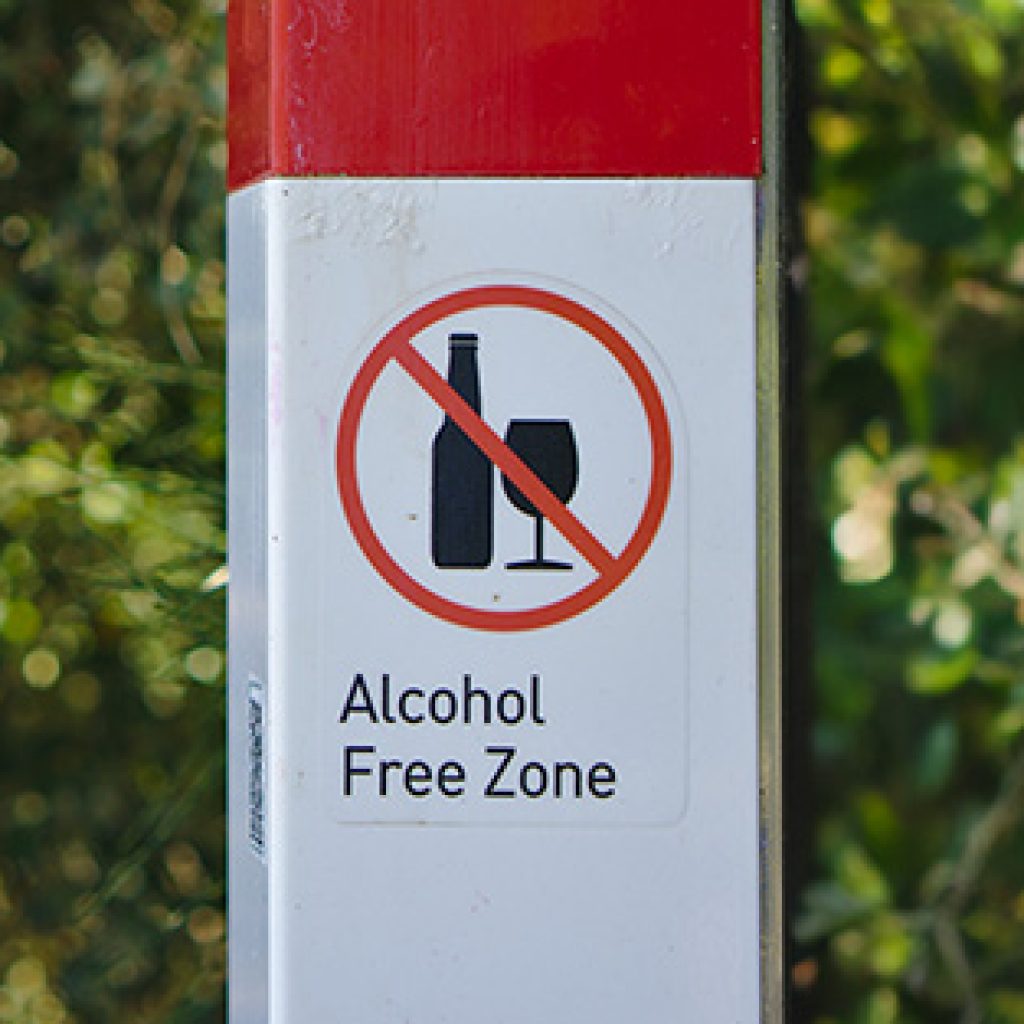Listen to a Podcast: It’s good for your brain!
Listen to a Podcast: It’s good for your brain!
Who Listens to Podcasts and Why Do They Listen?
According to Statista, 120 million people listened to a podcast in 2021. In 2020, 55% of consumers in the U.S. above the age of 12 years listened to audio podcast, up 4% from 2019 (Statista 2019). If that figure surprises you, the U.S. actually does not lead the world in podcast listening (Winn, 2020). That distinction belongs to South Korea, followed by Spain, Sweden, Australia, and the United States.
The number one reason given by respondents for listening to non-musical podcasts was “to learn new things,” with 74% citing this as the reason for enjoying podcasts. Other reasons for podcast listening on a regular basis were for entertainment, to relax, or to be inspired (“Main reasons for using podcasts in the U.S. 2019,” 2019). Mobile applications on portable electronic devices such as smartphones and tablets are used by 65% of podcast listeners (Edison Research, n.d.). In addition, 32% of Americans listen to podcasts on a monthly basis, with 82.4% spending more than seven hours each week tuning in to podcases (Discover the Best Podcasts | Discover Pods | Find your next favorite podcast, n.d.) . An amazing 90% listen to podcasts at home, while others listen while driving or on walks. Most people (7 out of 10) listen without doing anything else and the rest multitask, doing housework, driving, or cooking while listening. Weekly podcast listeners subscribe to an average of six podcasts and listen to seven shows each week (Edison Research, 2019). The age of monthly podcast listeners versus US population (Infinite Dial, 2020):
-
- 12-34: 48% (vs 37%)
- 35-54: 32% (vs 40%)
- 55+: 20% (vs 23%)
More information about podcasters, why, and how they listen is available in this 2019 Podcast Stats & Facts Infographic from Podcastinsights.com:
Podcasting Stats & Facts: 2022 US Podcast Statistics
- 79% of US population are aware of podcasts
- 62% have listened to a podcast
- 38% of the population had listened to podcast in the last month
80% listen to all or most of each podcast episode and listens to an average of 7 shows per week:
- 3% don’t know
- 5% only beginning
- 12% less than half
- 35% entire episode
- 45% most of episode
Listeners by gender:
- 44% women
- 56% men
Percentage of US population listening monthly:
- 2013 = 13%
- 2014 = 15%
- 2015 = 18%
- 2016 = 21%
- 2017 = 24%
- 2018 = 26%
- 2019 = 33%
- 2020 = 37%
- 2021 = 41%
- 2022 = 38%
Why Are Podcasts So Popular?
Podcasts are quickly taking over where traditional radio shows left off. The appeal of podcasts is easy to understand because they are ultimately available through the use of easy to use technology and they are tailored to any interests. By May 2021, over two million podcasts with over 48 million episodes were available to stream directly into your earbuds and speakers (Podcasthosting.org). If learning new things, relaxing, being entertained, and getting inspired are not enough to pique your interest, then how about stimulating your brain? In 2016 researchers at UC Berkley published a study that revealed what happened to the brains of subjects who listened to hours of narrative stories (Huth et al., 2016). Prior to the study, other studies only examined a few stimulus conditions and there was no study that revealed semantic information within the entire semantic system of the brain in a comprehensive way. Looking at neuroimaging brain models showing the brains response to listening to two hours of spoken narrative stories, researchers found a symmetry in semantic representation across both cerebral hemispheres. This finding is different from previous studies that found semantic representation localized to the left hemisphere. The implication is that listening to podcasts is quite similar to listening to narratives, which can stimulate many parts of the brain. Listening to different types of podcasts, such as meditation, comedies, or crime thrillers, will also activate different areas of the brain. Thus, meditation podcasts should cause the release of dopamine that sooths us; crime thrillers cause the release of adrenaline and endorphins that excite us and make us feel good, and comedies activate the frontal lobe and cerebral cortex and reduce levels of cortisol to lower stress and anxiety (Mallach, 2020).
Other reasons for the popularity of listening to podcasts are outlined in Why Do People Listen to Podcasts in 2021? Some of the reasons listed include “To Get Over a Creative Block,” “To Stay Informed About Current Events,” and “ To Improve Wellbeing.” Along with recommendations for appropriate podcasts for accomplishing these goals are a few key words that will help with further searches for appropriate podcasts (Fang, 2020).
Exciting New Podcast Episodes From CASAT Podcast Network
The CASAT Podcast Network is a collection of behavioral health related podcasts that are developed and produced by CASAT. These podcasts include: CASAT Conversations, Lions Tigers & Bears MI, Pack Chats, Pack N Recovery, and Rose Colored Glasses. Rose-Colored Glasses is the newest podcast that features discussions on how alcohol use and the risk for alcohol-related problems change through different life stages – adolescence, college, early-careers, pregnancy, parenting, empty nest, retirement and aging. You may also enjoy the CASAT Podcast Network’s Lions and Tigers and Bears MI!, where Motivational Interviewing Network Trainers Amy Shanahan and Paul Warren discuss “the intricacies of the MI spirit, intentionality, evoking change talk, and reveal what MI is not.” If you are a student, you may want to check out Pack N Recovery. This podcast is made by people in recovery, for people in recovery. CASAT Conversations just launched their third season, which focuses on the complex topic of Health Equity.
We hope that you will check out our podcasts, and subscribe to each one of them so that you can stay up to date on the latest episodes.
To view resources, links, and Learning Labs related to the upcoming and future seasons of CASAT Conversations, visit the CASAT OnDemand Resources tab. For blog posts related to a variety of behavioral health topics, visit the Catalyst blog page.
Are you a “Podcaster?” Do you have favorites that you listen to on a regular basis? Please share your thoughts on podcasts in the comments.
References
(n.d.). Discover the Best Podcasts | Discover Pods | Find your next favorite podcast. https://discoverpods.com/wp-content/uploads/2019/09/The-Podcast-Trends-Report-2019-1.pdf
(n.d.). Edison Research. https://www.edisonresearch.com/wp-content/uploads/2019/04/Edison-Research-Podcast-Consumer-2019.pdf
Fang, W. (2020, December 4). Why do people listen to podcasts in 2021? Listen Notes. https://www.listennotes.com/podcast-academy/why-do-people-listen-to-podcasts-in-2021-5/
Huth, A., de Heer, W., Griffiths, T. et al. Natural speech reveals the semantic maps that tile human cerebral cortex. Nature 532, 453–458 (2016). https://doi.org/10.1038/nature17637
Main reasons for using podcasts in the U.S. 2019. (2019, February 15). Statista. https://www.statista.com/statistics/610691/main-reasons-listening-to-podcasts-us/
Mallach, H. (2020, September 22). Why listening to podcasts is good for your brain. Good Housekeeping. https://www.goodhousekeeping.com/health/wellness/a34100126/podcast-brain-benefits/
U.S. consumers who listen to audio podcasts 2020. (2020, March 23). Statista. https://www.statista.com/statistics/188955/percentage-of-us-adults-who-listen-to-audio-podcasts-since-2006/
Winn, R. (2020, April 21). 2020 podcast stats & facts (New research from Apr 2020). Podcast Insights®. https://www.podcastinsights.com/podcast-statistics/
Blog Post Tags:
Related Blog Posts
Related Learning Labs
Related Resources
.
- Buscar Tratamiento de Calidad para Trastornos de uso de Sustancia (Finding Quality Treatment for Substance Use Disorders Spanish Version)
- Finding Quality Treatment for Substance Use Disorders
- Focus On Prevention: Strategies and Programs to Prevent Substance Use
- Monthly Variation in Substance Use Initiation Among Full-Time College Students
- The National Survey on Drug Use and Health (NSDUH) Report: Monthly Variation in Substance Use Initiation Among Adolescents









